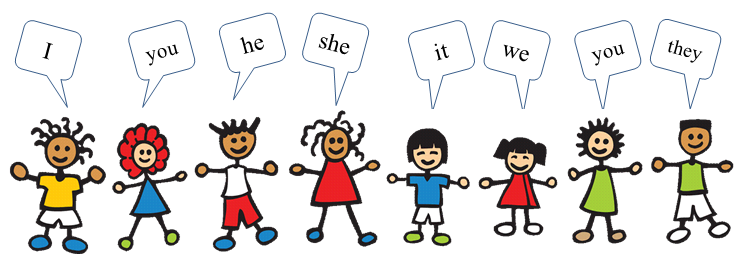Personal pronouns in German

Personal pronouns in German.In the intricate tapestry of language, few elements are as ubiquitous yet overlooked as personal pronouns. At first glance, they seem like simple placeholders words like “he,” “she,” “they,” and “we” that stand in for names or nouns. But delve a little deeper, and you’ll find that these tiny linguistic units carry a disproportionate weight in shaping identity, social relations, and even cultural norms.

Explanation about personal pronouns in German
Subject Pronouns:
Ich (I)
Du (You, informal singular)
Sie (You, formal singular and plural)
Er (He)
Sie (She)
Es (It)
Wir (We)
Ihr (You, informal plural)
Sie (They)
Object Pronouns (Accusative):
Mich (Me)
Dich (You, informal singular)
Sie (You, formal singular and plural)
Ihn (Him)
Sie (Her)
Es (It)
Uns (Us)
Euch (You, informal plural)
Sie (Them)
Object Pronouns (Dative):
Mir (Me)
Dir (You, informal singular)
Ihnen (You, formal singular and plural)
Ihm (Him)
Ihr (Her)
Ihm (It)
Uns (Us)
Euch (You, informal plural)
Ihnen (Them)
German also incorporates the notion of “case” more explicitly than English, meaning that pronouns may change form depending on whether they are nominative (subject), accusative (direct object), dative (indirect object), or genitive (possessive).
For instance, in the sentence “Ich gebe ihm das Buch” (“I give him the book”), “Ich” is the subject and is therefore in the nominative case, while “ihm” (which stands for “him”) is the indirect object and is in the dative case.
Gender Sensitivity and Pronouns:
Like English, German has seen some debates around gender-neutral and inclusive language. In German, however, this is complicated by the gendered nature of nouns. While the gender-neutral “sie/Sie” (they/They) is increasingly being used, efforts for a more inclusive language are ongoing and might involve complex grammatical adjustments.
Examples for using personal pronouns in German
| Role / Pronoun | Singular | Plural | Example Sentence (English Translation) |
|---|---|---|---|
| Nominative (Ich) | Ich | Wir | Ich sehe dich. (I see you.) |
| Accusative (Mich) | Mich | Uns | Du siehst mich. (You see me.) |
| Dative (Mir) | Mir | Uns | Du gibst mir das Buch. (You give me the book.) |
|---|---|---|---|
| Nominative (Du) | Du | Ihr | Du siehst mich. (You see me.) |
| Accusative (Dich) | Dich | Euch | Ich sehe dich. (I see you.) |
| Dative (Dir) | Dir | Euch | Ich gebe dir das Buch. (I give you the book.) |
|---|---|---|---|
| Nominative (Er) | Er | Sie (They) | Er sieht dich. (He sees you.) |
| Accusative (Ihn) | Ihn | Sie (Them) | Du siehst ihn. (You see him.) |
| Dative (Ihm) | Ihm | Ihnen (Them) | Du gibst ihm das Buch. (You give him the book.) |
|---|---|---|---|
| Nominative (Sie) | Sie (She) | Sie (They) | Sie sieht dich. (She sees you.) |
| Accusative (Sie) | Sie (Her) | Sie (Them) | Du siehst sie. (You see her.) |
| Dative (Ihr) | Ihr (To her) | Ihnen (To them) | Du gibst ihr das Buch. (You give her the book.) |
Sentenses for using personal pronouns in German
| Case / Role | Singular | Plural | Example Sentence | English Translation |
|---|---|---|---|---|
| Nominative | Ich | Wir | Ich lese ein Buch. | I am reading a book. |
| Du | Ihr | Du spielst Fußball. | You are playing soccer. |
| Er, Sie, Es | Sie | Er geht zur Schule. | He is going to school. | |
|---|---|---|---|---|
| Accusative | Mich | Uns | Er ruft mich an. | He is calling me. |
| Dich | Euch | Ich sehe dich im Park. | I see you in the park. |
| Ihn, Sie, Es | Sie | Wir kennen sie gut. | We know her well. | |
|---|---|---|---|---|
| Dative | Mir | Uns | Sie gibt mir einen Apfel. | She gives me an apple. |
| Dir | Euch | Kannst du dir das vorstellen? | Can you imagine that? | |
| Ihm, Ihr, Ihm | Ihnen | Ich schenke ihm ein Buch. | I give him a book as a gift. |
In conclusion, personal pronouns are far more than simple linguistic elements used to reference speakers, listeners, or others. They are symbols loaded with social and cultural significance. By understanding the use of pronouns and analyzing the contexts in which they appear, we can unveil norms of identity, gender, and social interaction within a particular community.






























